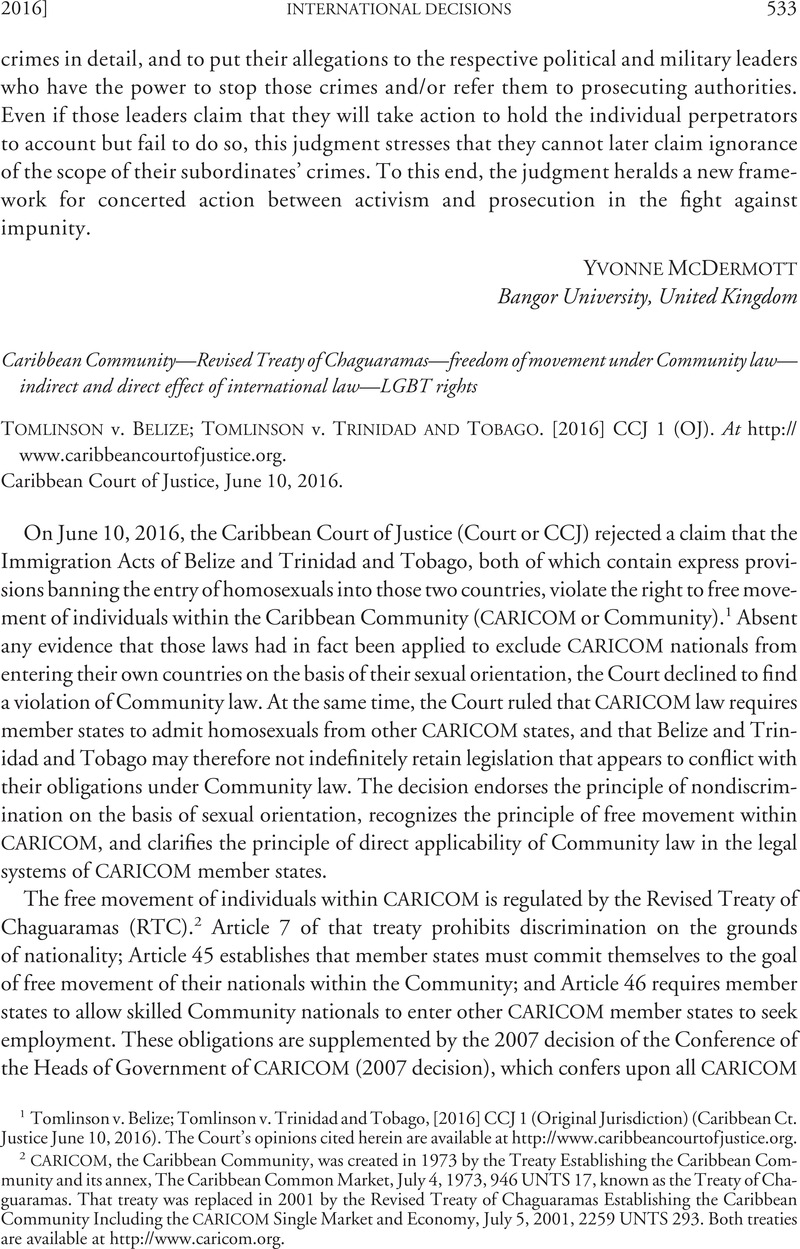Published online by Cambridge University Press: 20 January 2017

1 Tomlinson v. Belize; Tomlinson v. Trinidad and Tobago, [2016] CCJ 1 (Original Jurisdiction) (Caribbean Ct. Justice June 10, 2016). The Court’s opinions cited herein are available at http://www.caribbeancourtofjustice.org.
2 CARICOM, the Caribbean Community, was created in 1973 by the Treaty Establishing the Caribbean Community and its annex, The Caribbean Common Market, July 4, 1973, 946 UNTS 17, known as the Treaty of Chaguaramas. That treaty was replaced in 2001 by the Revised Treaty of Chaguaramas Establishing the Caribbean Community Including the CARICOM Single Market and Economy, July 5, 2001, 2259 UNTS 293. Both treaties are available at http://www.caricom.org.
3 Conference Decision, in CARICOM Secretariat, Draft Report for the Twenty-Eighth Meeting of the Conference of the Heads of Government of the Caribbean Community, Doc. HGC/2007/28/DR, at 8 (July 1–4,2007).
4 Myrie v. Barbados, [2013] CCJ 3 (OJ).
5 Quoting id., para. 80.
6 Immigration Act, Laws of Belize ch. 156, sec. 5(1)(e) (rev. ed. 2000) (providing that “any prostitute or homosexual or any person who may be living on or receiving or may have been living on or receiving the proceeds of prostitution or homosexual behavior” is a “prohibited immigrant”).
7 Immigration Act, Laws of Trinidad and Tobago ch. 18:01, sec. 8(1)(e) (rev. ed. 2014).
8 For an analysis of the creation and institutionalization of the CCJ, see Salvatore Caserta & Madsen, Mikael Rask, Between Community Law and Common Law: The Rise of the Caribbean Court of Justice at the Intersection of Regional Integration and Post-colonial Legacies, 79 Law & Contemp . Probs. 89 (2016)Google Scholar.
9 Trinidad Cement Ltd. v. Guyana, Interim Order, [2008] CCJ 1 (OJ); Trinidad Cement Ltd. v. Guyana, [2009] CCJ 1 (OJ) [ TCL II ].
10 TCL II, para. 38.
11 Id., para. 32.
12 Trinidad Cement Ltd. v. Guyana, [2009] CCJ 5, paras. 24–27 (OJ).
13 See Madsen, Mikael Rask, The Protracted Institutionalization of the Strasbourg Court: From Legal Diplomacy to Integrationist Jurisprudence, in The European Court of Human Rights Between Law and Politics 43 (Christoffersen, Jonas & Madsen, Mikael Rask eds., 2011)CrossRefGoogle Scholar.
14 Myrie v. Barbados , supra note 4, paras. 1–3.
15 Agreement Establishing the Caribbean Court of Justice, Feb. 14, 2001, 2255 UNTS 319, available at http://www.caribbeancourtofjustice.org.
16 Myrie, supra note 4, para. 10.
17 Case 6/64, Costa v. Enel, 1964 ECR 585.
18 Myrie, supra note 4, para. 50.
19 Id., paras. 51–52.
20 See David S. Berry, Caribbean Integration Law 211 (2014).
21 Tomlinson v. Belize; Tomlinson v. Trinidad and Tobago, [2014] CCJ 2, para. 6 (OJ).
22 The acte clair doctrine clarifies when the highest EU national courts are not obliged to make a preliminary reference to the Court of Justice on a question of interpretation of EU law. See C-283/81, C.I.L.F.I.T. v. Ministry of Health, 1982 ECR 3415.